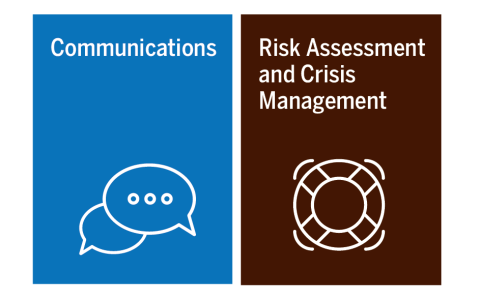Today’s 24/7 news cycle and pervasive social media present new challenges for education abroad professionals. Stakeholders, both on and off campus, come to the international office with their opinions and perceptions about particular locations or recent world events. Whether risks are unsubstantiated or legitimate, how do international offices address growing anxiety from students, parents, and the campus community?
In this NAFSA e-Learning Seminar, presenters will discuss managing perception versus reality, creating a proactive communication plan that addresses stakeholder concerns, and best practices for preparing your office to manage crisis communication.
Learning Outcomes
After attending this NAFSA e-Learning Seminar, participants will be able to:
- Explain global safety trends affecting perceptions of student health, safety, and security;
- Identify pressures of managing stakeholder opinions and fears;
- Develop a framework for an international crisis communication and messaging plan; and
- Create a messaging strategy.
The content of this seminar will be relevant to educators in education abroad, risk management, or involved with crisis management and communication.
Presenters
 Maureen Gordon
Maureen Gordon
Arcadia University
Maureen Gordon is the director of health, safety, and security for the College of Global Studies at Arcadia University. She is responsible for developing and maintaining the college’s emergency protocols and policies, collaborating with overseas staff on risk assessment; program safety and security; and training staff on health and safety issues. Gordon is a graduate of Temple University, where she earned a BA in studio art. Gordon began her international education career working in education abroad at Temple, where she was responsible for administration of the university’s programs in Italy, Japan, and Spain, with a particular focus on health and safety matters. She holds a master’s degree in educational leadership and policy studies from Temple and has presented widely at both regional and national NAFSA events. She has served as chair of NAFSA’s Local Arrangements Committee and as a membership and networking coordinator for NAFSA’s Region VIII.
 Jason Hope
Jason Hope
University of Kentucky
Jason Hope is director of international health, safety, and security at the University of Kentucky (UK). In this role, Hope works closely with the health and safety aspects of international education, manages UK’s international insurance policy, and is responsible for international crisis management. He partners with education abroad in the development of faculty-directed programs and implementation of health and safety protocols, and works closely with all students petitioning to travel to higher-risk destinations. He holds bachelors’ degrees from UK in international relations and Spanish, and a master’s degree from UK in educational policy studies and evaluation. He also holds a graduate certificate in emergency management from Eastern Kentucky University. Hope currently serves as content coordinator for health and safety for NAFSA’s Education Abroad Knowledge Community and is an active member of PULSE, a national network of international higher education risk professionals. He is a 2018 recipient of the Fulbright International Education Administrators Seminar grant in Germany.
 Miko McFarland
Miko McFarland
University of Kentucky
Miko McFarland is executive director of education abroad and exchanges at the University of Kentucky, where she oversees the education abroad team and portfolio of programs that include faculty-directed programs, exchanges, and partner and consortia programs, as well as internships and for-credit community engagement opportunities. McFarland received a BA degree in anthropology and a master’s degree in international affairs and administration from Missouri State University. She served as Missouri State University's study away advisor for more than four years before transitioning to a leadership role at the University of Kentucky. McFarland plays an active role within international education, maintaining an active presence on regional, national, and international advisory boards. She is a NAFSA Academy for International Education alum and a contributing author to NAFSA publications. McFarland regularly presents sessions that promote best practices in education abroad programming, international risk management, and faculty engagement.
Ready to start learning?
When you register, you will have 60 days to experience your content when it's convenient for you! Look for your access link in your registration receipt, on your MyNAFSA page, or by going directly to the learning portal.
For details on registering and accessing, review the FAQ page.
Build Your Competencies
NAFSA International Education Professional Competencies 2.0 outline the abilities, skills, and foundational knowledge necessary for successful international educators. Learn more about NAFSA Competencies 2.0.
This learning content targets the competency categories of Communications and Risk Assessment and Crisis Management.

